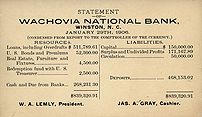
- Image via Wikipedia
There are a number of reasons that companies make the decision to purchase new accounting software. Perhaps they want to improve their efficiency or are looking for ways to generate more timely reports. There is no doubt that, when selected and implemented properly, good software can put more information at your fingertips than you previously imagined. However, many business owners fall in to the trap of thinking that simply putting all their accounting data in to a piece of software will magically solve all their problems. Unfortunately, this is not the case.
It is often helpful to understand the technical capabilities of your end-users when selecting new software. In the end, what you get out of the software will be directly dependent on what and how you put information in to the system. Computerizing your financials can speed up your abilities to generate reports and analyze data, but only if the data is input accurately in the first place by people that are comfortable with the software.
Many people often ask “What’s the best accounting software on the market?” There is no definite answer to this question. It can be likened to asking, “What is the right car to buy?” The answer depends on each individual business requirement. Some questions you need to ask include: Which features are important for the business? How many people will use the financial software? How much is the budget? What support is available from the vendor? What security measures are available to prevent unauthorized access in the accounting application? Is the package capable of handing payroll function including 1099s? Is it convenient? Is there enough space to grow the financial system? Can it accommodate the growing needs of a business? Is training available from the vendor? What do accounting software reviews say about the application? Are there external support services available that are not connected to the vendor? It is also recommended for you to read accounting software reviews to know the features and functionality of different applications.
When investigating new financial software, many business owners, especially smaller businesses, are tempted to avoid spending money on new software and use a spreadsheet program instead. Be warned – these spreadsheets quickly turn from simple to complex and are often difficult to keep track of what sheet shows what information and how it’s all inter-connected. Additionally, spreadsheet data can be easy to manipulate which can lead to inaccurate financial reports. On the bright side, if you’re currently using spreadsheets to track accounting, you may be able to find a new accounting software package that will import all of your old data.
New financial software comes in numerous varieties with many, many different levels of functionality and ease of use. Before making a big investment in a new system, it is important to do proper research up front. With proper due diligence, you can find the software solution that is right for your company that will allow you to do exactly what you want it to in a more efficient and cost-effective manner than you are currently using.
![Reblog this post [with Zemanta]](http://img.zemanta.com/reblog_e.png?x-id=91a2373b-5436-4963-8ae7-233e1066c12d)

